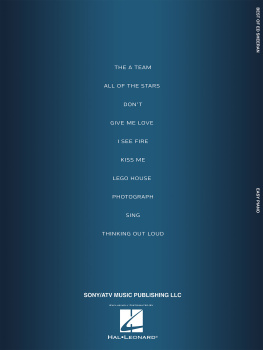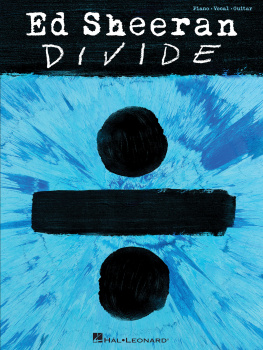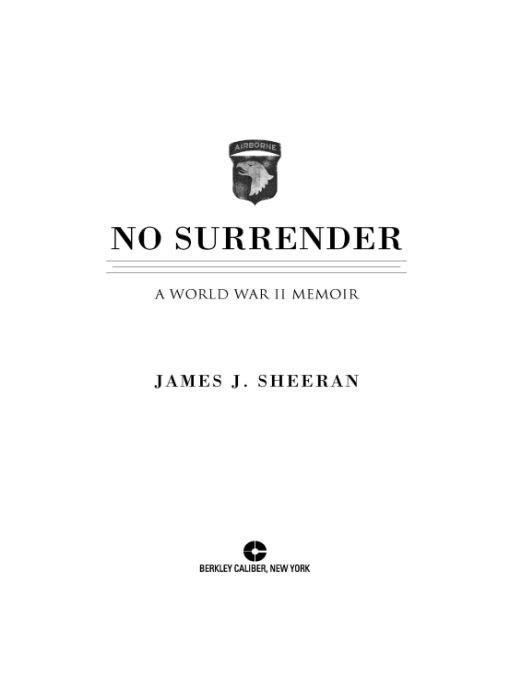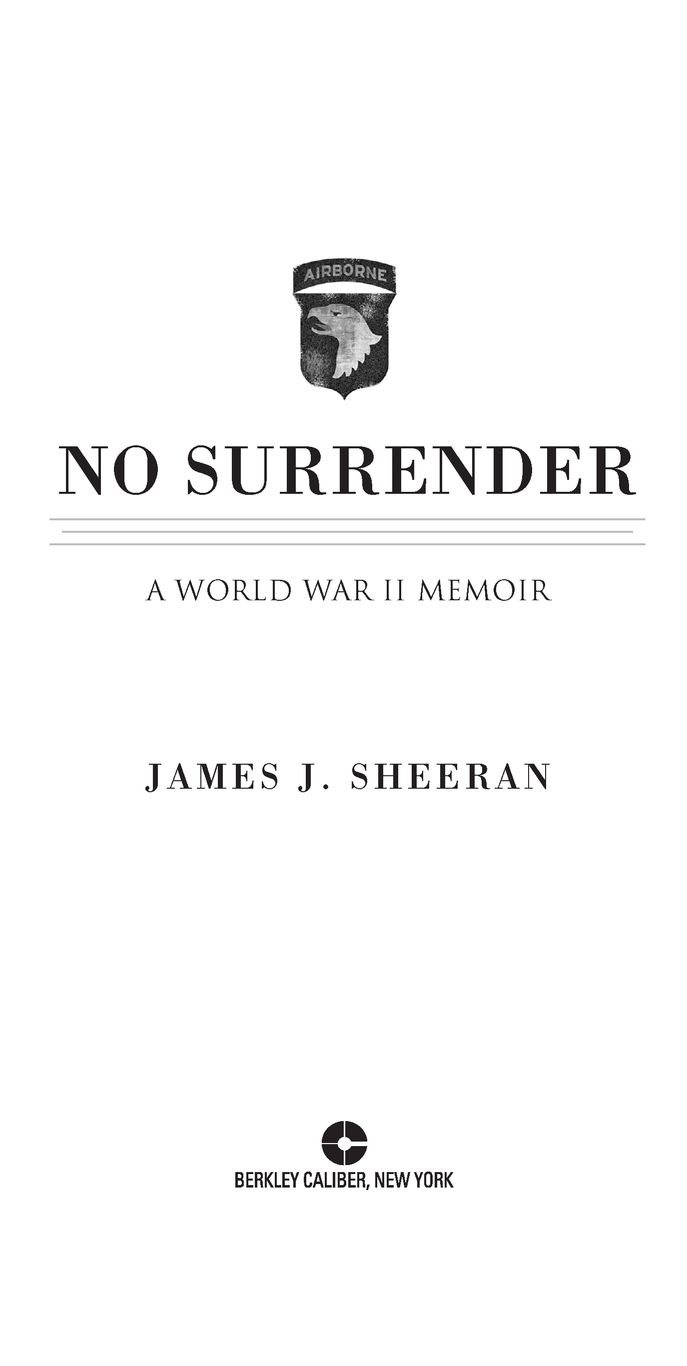Table of Contents
Preface
When I met Jim Sheeran in the early 80s, he recounted his incredible wartime experiences and told me that he had always wanted to write his wartime memoir.
Jim was dyslexic and as a result he was extremely observant and possessed a keen memory for details of his surroundings. From the moment he jumped out of the C-47 over Sainte-Mre glise, Normandy, France, on D-Day minus 8 (hours), he remembered almost every scene and every event that happened during the ensuing months of his unique war story as told in this memoir. Based on his memories, and with efforts to get others perspectives through a number of interviews with his buddies from his outfit, particularly with Burnie Rainwater, who took the journey behind the lines with him, he had prepared various vignettes all written in long hand throughout the years. By the time I met Jim, his secretary had already begun typing up his drafts and also begun transcribing his various interviews.
After the war his French-born mother had corresponded with a number of her countrymen who hid him and helped him during the war. Jim had saved all those letters and postcards, which, some forty-nine years later, provided us the basis to begin our reconnection with some 80 percent of those who hid him.
On the fiftieth anniversary of D-Day, we took Burnie back to France with us and met with more than one hundred members of the Maquis who had fought alongside Jim and Burnie in the Argonne Forest during the war. We gathered at their campsite in the forestLa Fontaine de Ferdinandand had a wonderful picnic in the forest. They presented Jimmy (all the French comrades called him Jimmy) with an old aluminum lunch box. Jimmy knew right away that it was his lunch box from the days he had spent in the forest, because it bore the letters JJS USA, which he remembered carving on its backonly the box had been pitch-black back then from being used every day over the campfire.
During the next twelve years, we returned every year to verify the facts told in this book with those who had shared parts of Jimmys adventures.
Finally, Jim spent almost five full years from 1998 to 2003 working on finalizing his book. His daughter Josette Sheeran (Shiner), then a journalist and now the executive director of the World Food Program, had published an article about her fathers wartime experience in the Washington Times edition commemorating the fiftieth anniversary of D-Day, and subsequently she worked on the book with him whenever she could. He also spent more than a year working with Chris Slevin, a young writer who helped Jimmy organize all the vignettes into the chapters of the book. I know Jim would want to express his special thanks to Chris for the impressive writing skills and enthusiasm that he contributed to the project. Finally, the draft book was further edited by Laurie Rosin, a professional book editor who was also intrigued by Jimmys story and who was instrumental in getting the book to Scott Miller of Trident Media.
Today, as the book is finally getting published, I am sure Jim is smiling in Heaven. It was truly his lifetime dream and his most fervent wish to bring his incredible life experience to the world to enjoy.
Lena Chang Sheeran, Jimmys partner in life, love and business October 2010
CHAPTER 1
I didnt know exactly when zero hour was, but I knew it was getting close. Soon enough we would be strapping on our parachutes, guns, and gear.
General Eisenhower showed up unannounced. Thousands of paratroopers stood around the encampment, more than I had ever seen at once. The general spoke from a microphone, but he didnt need it. Every man remained silent and hung on his words.
General Eisenhowers talk made me feel determined to do the job. Im pretty sure it did the same for almost everyone there. He mentioned religion, and all the troops seemed to get it. Guys found the right chaplain and attended services that afternoon. Those who had no religion, or thought they had none, decided not to chance it and attended any service they could find. Some went to a couple of different services for extra protection.
I walked off by myself and found a place to pray. I said, Please, God, help me make it. Then I felt guilty. What right did I have to ask God for help? I never had prayed when the going was easy.
No way could I sleep after hearing the general, but I went back to the pup tent and tried to rest. Burnie was already there. He lay on his back, staring straight up. In the half-light I could see the whites of his eyes. The confinement bothered him. Burnie Rainwater was a full-blooded Cherokee and liked to move around and sleep under the stars.
I could have made small talk to pass the time, but he could have initiated the conversation, too. The silence spoke for itself. We both wanted to be alone with our thoughts.
The grass floor of the pup tent vibrated from the movement of trucks and men. I was anxious but not afraid. I knew just how to jump and land with my machine gun and where to have it set so I could get the field of fire I wanted.
Most paratroop outfits formed after jump school. Those men decided to be paratroopers after being drafted. My outfit all enlisted as paratroopers. We wanted to be in the 101st Airborne from the beginning, and we had been together from the start, for nearly two years.
Everyone knew his job. Everyone was good at everything, and some were more than good. No one could throw a grenade better than Engelbrecht. No one was faster at getting up a hill and signaling the situation on the other side than Calhoun. No one could slip his chute and land precisely where he wanted better than Neeper.
Everything wed worked so hard for was about to happen.
Now I rolled onto my side and used my arm as a pillow. My gear was spread out next to me. My rifle lay before me disassembled. I didnt feel like putting it together. Instead I closed my eyes and conjured mental pictures of my home and my family. The images of my mother and father and our house were as detailed as if I were standing in New Jersey at that moment and not killing time in a military camp in southern England.
I was a nineteen-year-old machine gunner, a private first class, and hadnt seen a hell of a lot of life.Not that I didnt want toI just hadnt found it yet. Id been laid twice, once in Paducah, Kentucky, right after I completed my five jumps to qualify for paratrooper, and once in Chattanooga, Tennessee. I was scared to death both times. I had seen those army training films about VD, showing guys going blind, with their pecker falling off, enormous balls, and holes in their lips. Those films had me terrified and searching for symptoms for months.
Id lived through sex. Would I survive what I knew would be one of the greatest invasions of all time?
Our outfit, the 506th Regiment, Company I, Third Battalion, First Platoon of the 101st Airborne Division, would jump eight hours before the main invasion forces hit the beaches. We and the Eighty-second Airborne were to be the first in. I could not think of the invasion on a big scale. I was too small a part of it and much too confused.
Restless, I stood up and stepped outside the tent. For the first time all day, the camp was relatively still. The balmy June air embraced me, and under other circumstances I would have enjoyed sitting in the grass under the late-day sun. My bones had just begun to thaw from the cold and damp English winter. Instead I was eager for nightfall. The darkness would change my restlessness into excitement, give me an edge, and help me concentrate. Id need all three for the impending jump that would propel me into the great unknown.













